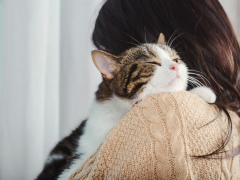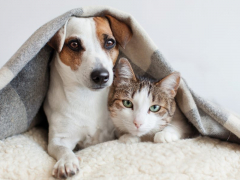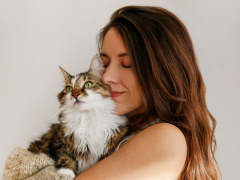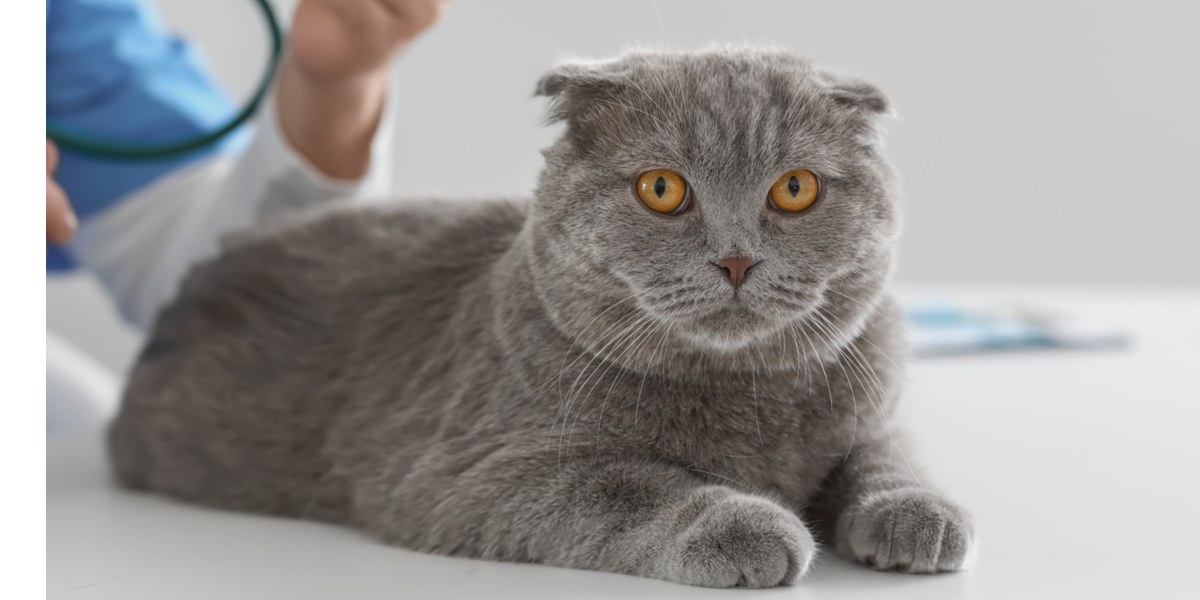
A diagnosis of heart disease in your cat can be worrying. This article aims to give you clear facts about what this diagnosis means, as well as the possible consequences for your cat’s health.
Quick Overview: Heart Disease in Cats
 Other Names: HCM, Restrictive cardiomyopathy, RCM
Other Names: HCM, Restrictive cardiomyopathy, RCM
 Common Symptoms: Loss of appetite, lethargy, difficulty breathing (exaggerated breaths or quick short breaths), open mouth breathing, exercise intolerance, collapse, hindlimb paralysis.
Common Symptoms: Loss of appetite, lethargy, difficulty breathing (exaggerated breaths or quick short breaths), open mouth breathing, exercise intolerance, collapse, hindlimb paralysis.
 Diagnosis: ECG (EKG), blood pressure, chest x-ray, echocardiogram (ultrasound of the heart), feline pro B-type natriuretic peptide (proBNP) blood test.
Diagnosis: ECG (EKG), blood pressure, chest x-ray, echocardiogram (ultrasound of the heart), feline pro B-type natriuretic peptide (proBNP) blood test.
 Requires Ongoing Medication: Yes
Requires Ongoing Medication: Yes
 Vaccine Available: No
Vaccine Available: No
 Treatment Options: Depending on stage or severity of disease, medications may be started to adjust blood pressure, to counteract blood clots, remove fluid build-up, and adjust heart rate and rhythm. Fluid may require active removal from the chest or abdomen. Hospitalization is needed for cats experiencing congestive heart failure causing breathing difficulty.
Treatment Options: Depending on stage or severity of disease, medications may be started to adjust blood pressure, to counteract blood clots, remove fluid build-up, and adjust heart rate and rhythm. Fluid may require active removal from the chest or abdomen. Hospitalization is needed for cats experiencing congestive heart failure causing breathing difficulty.
 Home Remedies: None
Home Remedies: None
What Is Heart Disease?
The heart, located in the chest, is one of the most essential organs in the body. The heart starts beating before a kitten is born, and continues to beat right up until the moment of death.
The heart’s job is to pump blood around the body, transporting oxygen and nutrients to the various organs and muscles, and removing carbon dioxide and waste products so that they can be removed from the body.
Heart disease occurs when the heart stops working normally, and is unable to carry out its normal functions. This leads to complications around the body and ongoing illness, and ultimately can lead to the death of a cat.
What Causes Heart Disease?
There are many different causes of feline heart disease, but they can be divided into two main groups.
- Congenital heart disease. This means the cat is born with defects of the heart, such as leaky valves, holes in the heart and other anatomic anomalies.
- Acquired heart disease. This means heart disease develops in a previously healthy cat, with problems such as cardiomyopathy (heart muscle disease) and valves that degenerate and start to leak. Sometimes, there is an underlying cause, such as hyperthyroidism. Rarer causes include neoplasia (cancer of the heart).
What Are the Signs of Heart Disease?
There are two situations when an owner may become aware of heart disease.
- An incidental finding. Often, a veterinarian may make the diagnosis of heart disease after listening to the cat’s chest with a stethoscope during a routine health check. In such cases, the problem is identified at an earlier stage, before the heart disease has become advanced enough for the cat to show signs of illness.
- Signs of illness. A cat may develop a range of signs, including dullness, inappetence, reduced activity, difficulty breathing, coughing, swollen abdomen and others. There are many possible causes of these signs, so affected cats should be taken to a veterinarian, who will make the diagnosis of heart disease after an examination and investigation.
How Does a Veterinarian Make a Diagnosis of Heart Disease?
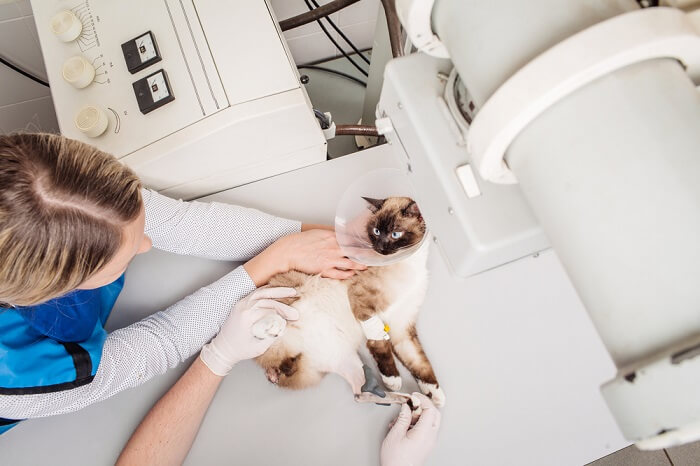
Heart disease is usually diagnosed by a veterinarian listening to your cat’s heart with a stethoscope, often during a routine health check.
There are two situations when an owner may become aware of heart disease.
Physical Examination
Any investigation of any problem in a cat starts with a careful, thorough physical exam of your pet. A cat with a heart condition may have other signs of ill health, such as increased lung sounds, rapid respiratory rate, ascites (fluid buildup in the abdomen), weakness of the hind limbs, changes in the eyes due to altered blood pressure, and other abnormalities.
Stethoscope
Heart disease is usually diagnosed by a veterinarian listening to your cat’s heart with a stethoscope, often during a routine health check.
As well as making the diagnosis, your vet will also note details about many aspects of your cat’s heart, including the heartbeat, heart rhythm, heart rate and regularity, and the presence of any heart murmur (a hissing sound, indicating turbulence of blood flow in the heart or leaky heart valves).
Once heart disease has been identified, your veterinarian will normally recommend further diagnostic testing to find out the underlying cause of your cat’s abnormal heart.
Ultrasound Examination
Detailed analysis of heart disease is usually accomplished with an echocardiogram (so-called echocardiography) or an ultrasound examination of the heart.
Ultrasound of the heart enables detailed evaluation of the heart muscle, the heart chambers, the valves of the heart and other structures around the heart. Subtle details, like a pleural effusion (fluid gathering around the lungs), may be identified.
X-Rays
Your vet may recommend chest x-rays, to visualize the size and shape of your cat’s heart, as well as other structures in your cat’s thorax (chest). Cats with heart problems often have enlargement of the heart chambers (the right or left ventricle and the atria), as well as blood vessels (e.g., aortic enlargement), as well as patterns of infiltration of the lungs.
Advanced Imaging
Rarely, other types of imaging such as CT or MRI scans may be carried out, to obtain very detailed visualization of the heart and associated structures.
Electrocardiogram
An electrocardiogram (ECG) is a recording of the electrical activity in your cat’s heart. This can be a useful way of gaining extra information about your cat’s cardiac function, as part of a gold standard approach to an investigation. It’s particularly helpful if your cat has an arrhythmia (irregular heart rhythm).
Blood Pressure Measurement
High blood pressure (hypertension) is common in older cats and is often part of the complications of heart disease, so it can be important to monitor this.
Blood Tests
If an extra-cardiac cause of heart disease is suspected (such as anemia or hyperthyroidism), a blood sample may be taken for laboratory analysis to measure routine biochemistries, as well as specific tests, such as thyroid hormone levels.
Referral To A Specialist
Your local veterinarian may recommend referral to a veterinary cardiologist, who has a special interest in cardiology (disorders of the heart).
What Are the Symptoms of Heart Disease in Cats?
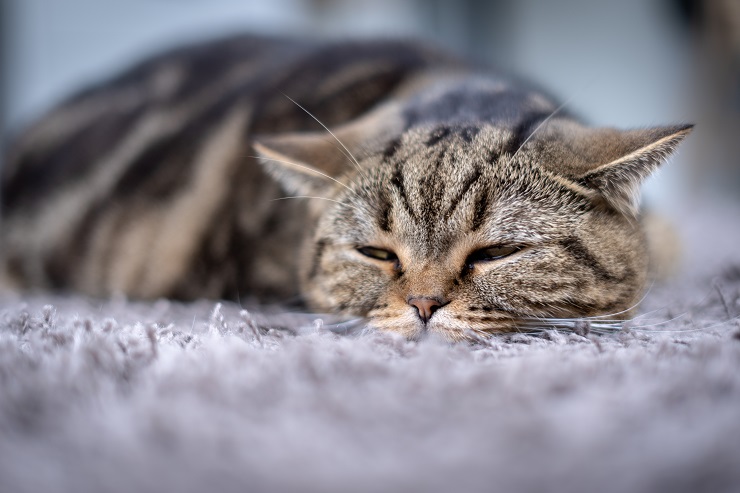
In the early stages, heart disease is asymptomatic, but if the heart disease is more advanced, then signs such as signs of congestive heart failure develop, including dullness, inappetence and reduced activity.
In the early stages, heart disease is asymptomatic (no external clinical signs). If heart disease is more advanced, signs such as signs of congestive heart failure develop, including dullness, inappetence, reduced activity, difficulty breathing (dyspnea), rapid breathing (tachypnea), coughing, swollen abdomen (ascites) or even collapse.
Other signs caused by complications of heart disease include:
Blood clots, including a particular problem called thromboembolism, when a blood clot forms in the left atrium (one of the small chambers of the heart) and a fragment lodges in a major blood vessel (typically the aorta, lower down in the body, close to blood supply to the hind legs). This causes weakness or paralysis in both hind legs, and can be a very painful problem, requiring urgent veterinary treatment.
Hypertension or high blood pressure, which can lead to sudden onset blindness due to hemorrhage at the back of the eye.
What Are the Different Types of Heart Muscle Disease (Cardiomyopathy)?
Heart muscle disease has three main forms:
- Hypertrophic cardiomyopathy (HCM) is the most common type of feline heart disease, accounting for around 60% of cases. Often the cause is unknown, but it’s more common in some pedigreed cat breeds, including Maine Coon cats, and Ragdolls, suggesting a genetic cause in some cases.
- Restrictive cardiomyopathy (RCM) is the second most common form of heart muscle disease in cats. In addition to heart enlargement, ventricular wall stiffness leads to poor filling of the heart and reduced functionality. It’s more common in certain breeds, including the Persian, Balinese, Birman, Burmese, Norwegian forest cat and Siamese, as well as mixed-breed domestic shorthair cats, suggesting some degree of genetic cause.
- Dilated cardiomyopathy (DCM) is rarer, and is most commonly caused by a nutritional deficiency, specifically an amino acid called taurine. This may be seen when cats are fed a canine diet or unbalanced home prepared food, but commercial cat food is sufficiently supplemented with taurine, so this is rarely seen now.
Treatment Options for Heart Disease in Cats
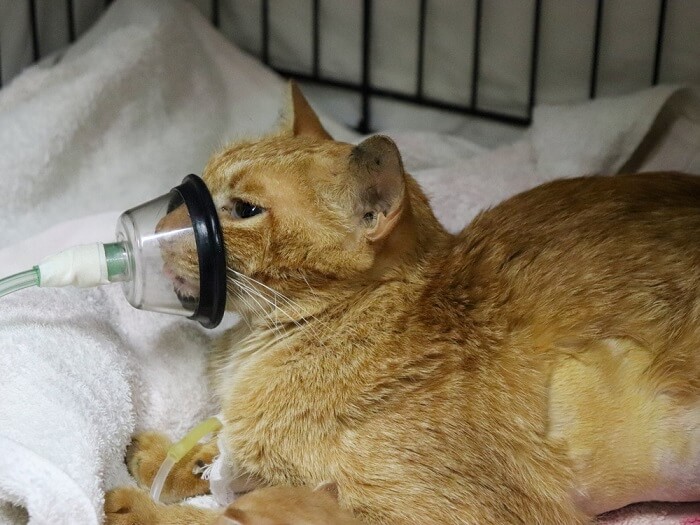
It is important to remember that the cause of the heart disease must be identified accurately, as innocent heart murmurs need no treatment whatsoever.
Heart disease in cats does not necessarily need treatment. The important fact to remember is that the cause of the heart disease must be identified accurately.
Innocent heart murmurs need no treatment, as they are harmless incidental findings that your veterinarian may mention to you after an examination.
- Significant heart murmurs caused by structural heart defects may lead to the necessity for treatment of heart failure in due course, depending on the severity of the problem.
- Cardiomyopathy (heart muscle disease) requires carefully planned treatment, depending on the precise nature of the type and severity of the condition.
- Thromboembolism is a complex disease that is challenging to treat, but there are various options that you should discuss with your veterinarian.
Treatment options for feline heart disease include a wide range of medications, including:
- Oxygen therapy is helpful for any cat in respiratory distress, which is common in cats when they present with heart disease
- Diuretics (such as furosemide) act to remove fluid from the system, which is helpful in many types of heart disease when the signs of illness are caused by fluid accumulation in the lungs or abdomen.
- Beta-blockers (such as atenolol ) are used especially with cases of hypertension
- Ace inhibitors affect blood vessels, causing widening, which makes it easier for blood to be pumped through the circulation, lessening the stress on the heart.
What Is the Life Expectancy of a Cat With Heart Disease?
The life expectancy depends on the cause of the heart disease. Cats with benign or innocent heart murmurs will have a normal life span. Cats with heart murmurs caused by life threatening structural defects of the heart and cats with cardiomyopathy (heart muscle disease) may only live for months or a few years.
In some cases, sudden death of affected cats can even occur. This is why it’s so important to gain an accurate diagnosis of the cause.
Talk To Your Vet
If your veterinarian tells you that your cat has heart disease, discuss the diagnosis in detail with your veterinarian so that the condition can be fully investigated, and a detailed treatment plan put in place.
Frequently Asked Questions
How long can cats live with heart disease?
This depends on the type of heart disease: some cats can live normal lifespans, while others may only live for weeks or months.
What are the signs of heart disease in cats?
Signs of heart disease include dullness, inappetence, reduced activity, difficulty breathing, coughing, swollen abdomen and others, depending on the precise type of disease.
Is heart disease in cats treatable?
Yes, there are many possible treatment options for most types of feline heart disease.
Are cats with heart disease in pain?
Heart disease generally is not painful, but one particular condition, thromboembolism of the aorta, tends to be very painful, and good quality pain relief is an important part of therapy.




